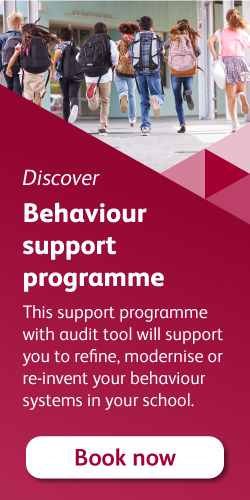
Beginning of term
Thirty eager faces, hands shooting up in the sky as soon as you ask a question, soon makes way for smirking furtive glances around the classroom, rocking back on two legs of the chair, and volunteering a reluctant answer only when asked directly! So how do we maintain the eagerness, the love of learning, and the hunger to answer questions and still look cool?
As teachers we know that some children have a knack of demonstrating keenness in the classroom, regularly volunteering answers to questions, confidently offering suggestions or explanations and even when not on the right track, still seeming to pull a witty remark out of the bag to look great in front of peers. For other students, sadly this eagerness stalls as they become aware of their peer group audience and understanding what that peer group might say when out of the teacher’s earshot.
I taught one boy in a year 7 class who was called ‘teacher’s pet’ by another student under his breath after he answered an open-ended question in detail and was awarded with my high praise and attention. He immediately turned around to the quiet bully and said aloud… “So what? I would rather be in the good books of my teachers as it makes the lesson more interesting. I know I will get a positive report on parent’s evening, and I earn positive points! Might as well make my life easy!”
As I prided myself on not having favourites and making a conscious effort to include every child during every lesson, I was a bit non plussed by this response, but this retort made the other students think hard and stopped this kind of remark from ever resurfacing in this class!
Eagerness, active listening, and engagement are all positive learning behaviours that we want to see in our classrooms but when the honeymoon period is over how do we ensure that these behaviours remain?
Three weeks in
In his highly recommended book ‘Running the Room,’ Tom Bennett sets out in detail the strategies we should employ to keep children on task and to keep our sanity. Firstly, and most importantly, behaviour is a curriculum, and children should be taught how to behave. In your classroom, it is your rules, but teach those rules, how students should respond to them, and repeat, often, until it becomes easy to behave and hard not to.
When you take on a new class it is too easy to think of them as one group with perhaps a few colourful characters. But all children are individuals, the sooner you know them as individuals the better, which means doing your homework, memorising faces to names, reading and utilising personal support plans or IEPs. No one behaviour strategy will work for all, but consistency is key, and children need to see you behaving consistently, and reacting to them consistently, even when you are tired or having a difficult day. Remember that all children want to matter, but good relationships are built of structure, high expectations, and tough love.
The SSAT Behaviour Audit tool is designed to audit the behaviour across a whole school, but the six areas are also applicable to individual classrooms.
- Your children are your priority. (Knowing and understanding your children and their influences) Great teachers spot children who are the class influencers very quickly and work to engage them in a positive way that will benefit you as the teacher and the whole class, but the better you know your children the better you will be able to maximise their learning potential with you, and this includes as much background information as you can find out.
- It is the norm to do the right thing. (Getting the culture right) Establish your classroom culture where you are the master but where the children quickly understand what you expect and, feel confident in their understanding of why this is important.
- Knowledge is power. (Knowing the data) Previous performance data on reading tests or KS2 baselines is useful so don’t overlook this. Data can provide clues to why individual children may find some things more difficult than others, but also allow you to put in place additional scaffolds to help and support their learning that can offset any possible disruption.
- Keep it simple. (Getting the basics right) Everyone likes simplicity. Children will often know the school behaviour system better than you do, how to navigate it and exploit it to their own advantage, so stick to it in your classroom without deviation but make it work for you.
- The devil is in the detail (Rewards, sanctions and red lines) Detail is important to children and they will quickly remind you of this. Consistency here is vital. Children will need to know what you expect in order to receive your praise and a possible reward. This should be for going above what you expect but will require explanation. Script (and rehearse) stock answers to those behaviours you know you will see. (being late to your class, not doing your homework, shouting out, forgetting equipment etc)
- Making the implicit explicit (Teach learning behaviours alongside managing behaviour) Teach the routines you know you will need within your class but also teach the transitions from activity to activity as this is often when things can go wrong. How will students transition from whole class questioning to group work, or from table work to the carpet area. Structure is vital here.
The wonderful thing about starting a new year is getting to know new personalities and watching them develop over the coming weeks and months and this is true of all children, at any age. I recently discovered that my nonverbal son, with serious and complex learning difficulties, loves the sound of gurgling plugs as the last litre of water disappears. He doesn’t need to watch, just to listen and starts to giggle whenever he hears one. It suddenly dawned on me that he purposefully follows me around when I am cleaning the bathroom, just so he can hear the noise that tickles him.
It reminded me that small things that spark curiosity can be the key to engagement, long after the honeymoon period has ended.
Behaviour support programme
This support programme with audit tool will support you to refine, modernise or re-invent your behaviour systems in your school.

